#selenska
Explore tagged Tumblr posts
Text
yle: No normal life
In a rare interview with Yle's Hanna Visala, Olena Zelenska talks about what the war has done to her family.
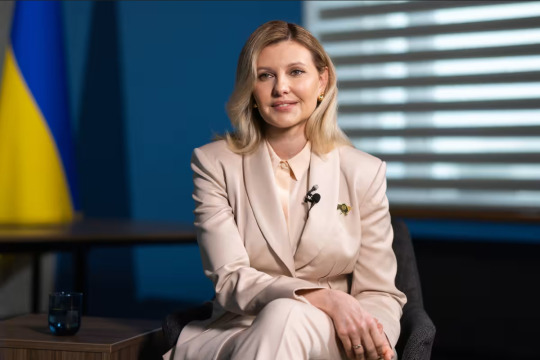
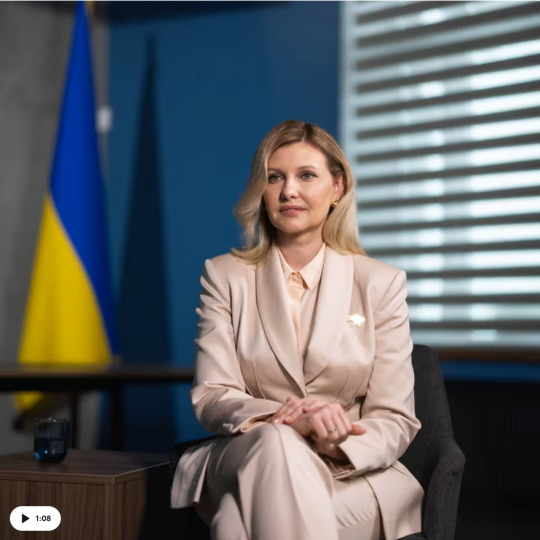
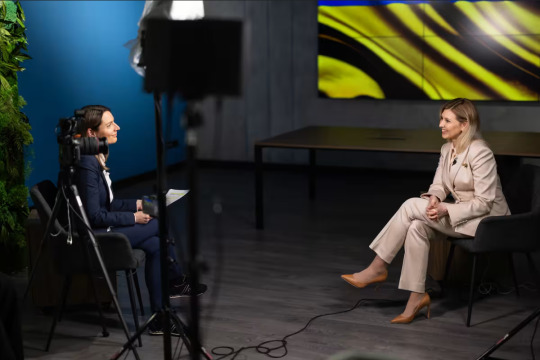
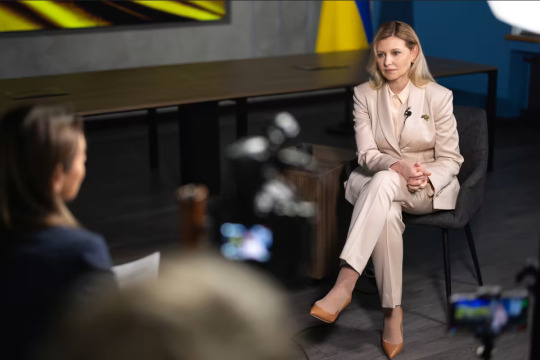
Hanna Visala
A car whizzes past roadblocks, sandbags and soldiers standing guard. We stop at two checkpoints to show our identity papers and equipment.
We finally reach our destination, the Ukrainian Presidential Office. In this heavily guarded building in the heart of Kiev, we get a rare interview. Ukraine's First Lady, the wife of Volodymyr Zelensky, has agreed to be interviewed by Yle.
- I'm fine, thanks for asking, says Olena Zelenska with a smile.
The question is an important one for Olena Zelenska. Zelenska runs a mental health programme called How Are You, and she asks the question to the Ukrainians she meets every day.
- I try to ask people how they are doing as often as I can, she says.
When Russia launched a major offensive in Ukraine just over two years ago, Olena Zelenska found herself in a role she had not expected.
The renowned screenwriter, who had written the role of her actor husband's President in the popular Ukrainian TV series Servant of the People, had suddenly become the wife of the President of a country at war.
The Zelensky's were thus already partners in a previous life, then in the TV production business.
- I remember waking up the morning after the attack. I thought it was all just a bad dream until I realised it was real, a terrible reality. It was a shock for all of us, Olena Zelenska, wife of the Ukrainian President, now recalls the beginning of the war.
She says there is not a day when the war is not on her mind. At moments, she says she is still able to live almost normally.
- When I help my son with his homework or we take care of our pets. But when the air raid siren goes off, we go back to reality, Zelenska says.
Like thousands of other Ukrainians, Zelenska and her children wake up to the sound of night-time shrieks. Zelenska describes the bomb shelter used by her family as "just an ordinary basement".
When the alarm is over, Zelenska returns with her children, Oleksandra, 19, and Kyrylo, 11, to their beds to sleep.
- In the morning, I wake the children for school, and we get on with life, but the pressure of war is ever-present. Life is not normal.
This Instagram post shows how life was still normal for the family before the war.
instagram
The war has torn apart thousands of families. The Zelensky family has also been forced to live apart because of the war. For the first two months, President Zelenskyi could not see his family at all.
The family is still living apart: the mother and children with each other and the father elsewhere.
Married for more than 20 years, communication between the couple is mainly limited to phone calls, sometimes video chats. However, they can now visit each other at least occasionally. And so it was today, just before the interview.
- My husband unexpectedly came to greet me in my office. We saw each other for ten minutes, says Olena Zelenska with a smile.
Commuting together provides a momentary relief.
- Even though the trips are busy and short, it feels like we are travelling together," says Zelenska.
My son, 11, is a military expert
The Zelenskyis' children spent their childhood and adolescence in the midst of war. Oleksandra, the first-born of the multidisciplinary parents, has followed in her father's footsteps and is studying law. The former TV star and current President also studied law. Olena Zelenska is an architect by training.
Olena Zelenska says that her daughter Oleksandra is now able to meet her friends.
And how often do the children see their father? Very rarely," says Zelenska.
- Then the children take every minute of his attention. The daughter talks about her studies, asks for advice, and the son clings to him, says Zelenska.
Zelenska mourns the fact that her children and all other Ukrainian children are missing out on the precious years of their youth and childhood.
- My daughter's daily routines are related to her studies, but she has no plans for the future. It is sad for me as a mother, says Zelenska.
According to her mother, her son Kyrylo has become almost a military expert.
- He knows all the types of missiles that Russia launches at us. He can also calculate their speed, says Zelenska.
As a mother, she would love to be proud of one of her child's other skills, she says.
- I wish my son could be interested in music, art, sports and not dream of being a military assistant or an air raid warden.
Arms aid has also been on Olena Zelenska's mind lately. Russia has got the upper hand in the war, and anti-aircraft missiles are dwindling by the day.
Relief is evident on the face of Ukraine's First Lady when the talk turns to the arms aid package finally approved by the US.
- It is a huge achievement. It really gives strength and hope. I thank everyone who worked to make it happen, says Zelenska.
Although the US arms package will not solve the war, it brings hope and a message that Ukraine has not been abandoned.
- It means that it will be easier for us to withstand bombardments and protect our people.
The job of the spouse of the President of a country at war is not an easy one. The spouse must stand by the people, create hope, represent and humbly ask for help from other countries.
Zelenska says she has heard countless stories of survival and countless sad stories, too. She spends almost all of her time helping her country to survive at a time when global war fatigue is beginning to show. Where does she get her strength from?
- When I succeed in repairing what the war has shattered and ruined. When I meet people, she responds.
Children kidnapped by Russia
Zelenska considers the most horrifying phenomenon of the war to be children stolen by Russia.
The Ukrainian authorities estimate that more than 19,500 Ukrainian children have been abducted by the Russians since the war began. Entire orphanages have been emptied, according to Ukraine.
According to the UN, this is a war crime. Ukraine has so far managed to return only 380 missing children.
- Some of the children have managed to self-report, use the telephone or internet and have been able to contact NGOs that have helped them, said Zelenska.
Zelenska has met children who have escaped from Russia. They have told her how school education in Russia is propaganda. Children are being trained to be Russian.
- They are taught that Ukraine does not exist. That no one is looking for them. It is psychological brainwashing. These children's lives are being destroyed.
According to Zelenska, orphaned children can disappear completely because Russia changes the spelling of their names. Names that look the same in Ukrainian and Russian are pronounced differently.
- When a name is entered in the Russian register according to the Russian pronunciation, the child can no longer be found by name, explains Zelenska.
- We also have information that Ukrainian boys aged 18 have been forced to join the ranks of the Russian army. It is terrible.
Ukraine has formed an international alliance with Canada to repatriate Ukrainian children.
- We are trying to create mechanisms to put pressure on Russia to provide information about the children and how to get them home, says Zelenska.
We do not want to return to the Soviet Union
Zelenska remembers when Ukraine gained independence from the Soviet Union in December 1991. She was 13 years old at the time.
- I remember the referendum on independence. Almost everyone wanted it. We got freedom and looked to the future with optimism.
And now, more than 30 years later, Ukraine has to fight for that freedom. Zelenska sighs.
- We don't want to go back to the Soviet reality, where there were no rights and no freedoms.
How does Olena Zelenska believe it will all end, and where does she see herself in five years' time?
- We do not know when the suffering will end. But I believe in the victory of Ukraine because it is the right thing to happen. Because that is how things should be in a just world.
Only then, she says, will it be time for the second question.
- Then, I start dreaming about what will happen in five years.
Article
#olena zelenska#russia#ukraine#war#ze interview#olena interview#olena selenska#2024#interview 2024#zelenska#selenska#yle#yle interview
3 notes
·
View notes
Text
The Presidental couple four years ago
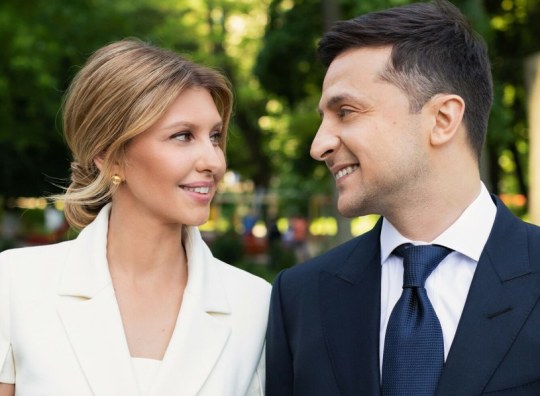
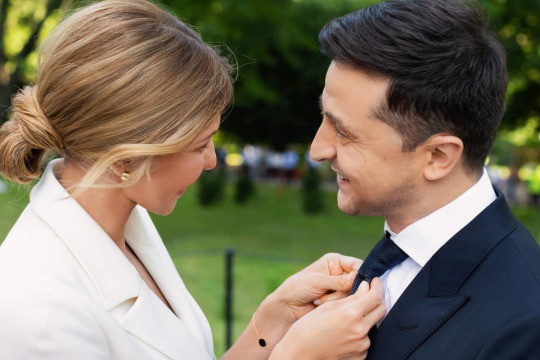



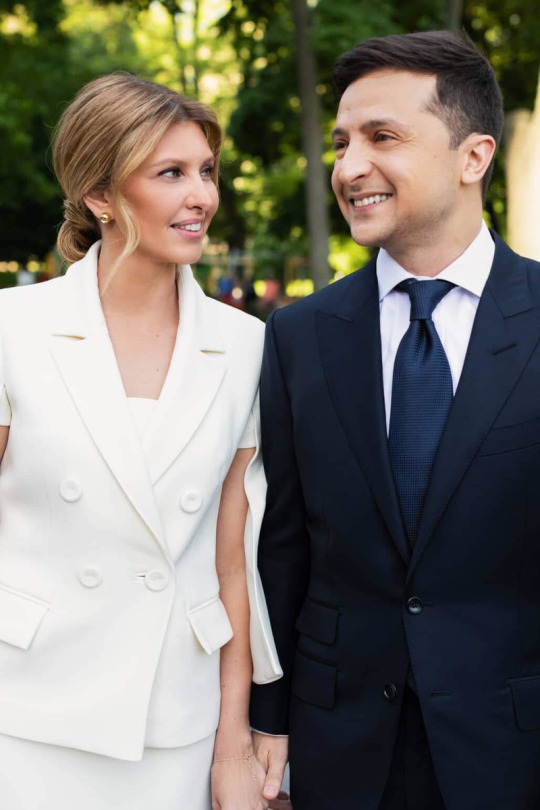


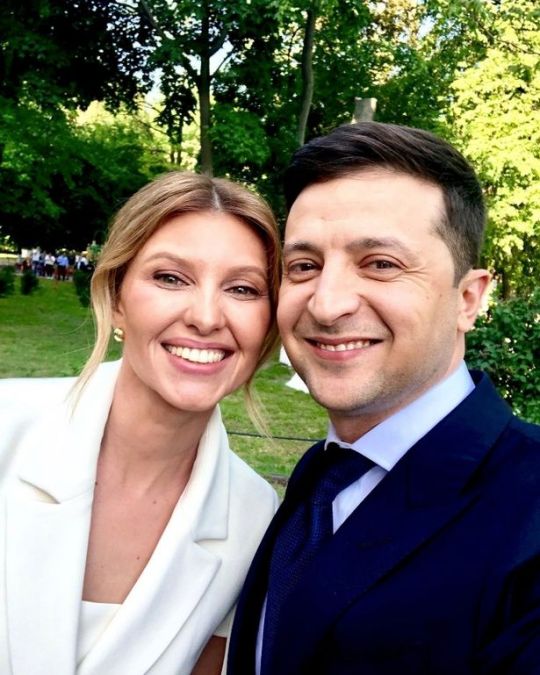
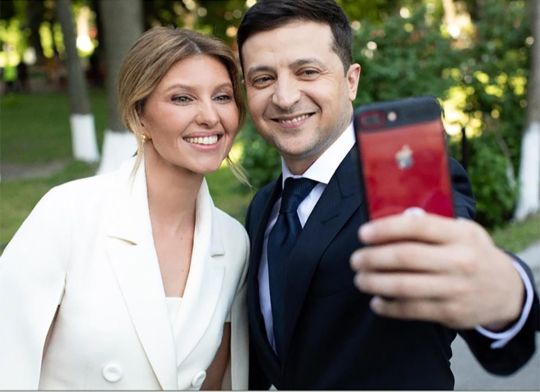


#again we ignore im late to the party#these photos ♥♥♥♥♥♥♥♥♥♥♥#forever in love with them#THE WAY THEY LOOK AT EACH OTHER#THE HAND HOLDING#volodymyr zelenskyy#olena zelenska#volodymyr zelensky#zelensky#zelenskyy#olena selenska#selenskyj#wolodymyr selenskyj#volena#presidency era#ze fashion
25 notes
·
View notes
Photo







King Charles III and Queen Camilla visit Liverpool Central Library, to officially mark the library's twinning with Ukraine's first public library, the Regional Scientific Library in Odesa, 26.04.2023
24 notes
·
View notes
Text
0 notes
Photo


source: www.pinterest.de/nachertano/
#Olena Zelenska#first lady#ukraine#ukrainian#women#bnw#Selenska#mother#wife#screenwriter#Kyiv#diplomacy#fashion#Ukrainian first lady
23 notes
·
View notes
Text
They also have another dog named Petya, a cat and his daughter has also a pet (I think, it was a guinea pig?!).
📣📣📣📣💥💥💥💥💥💟💟💟💟💟🐕🐕🐕
zelensky has a floofy pupper named Nora

that is all, carry on
#volodymyr zelensky#volodymyr zelenskyy#wolodymyr selenskyj#selenskyj#zelensky#zelenskyy#olena zelenska#olena selenska#ze private#research#ze fam
114 notes
·
View notes
Text
0 notes
Text
Selenskas Hemd hat rostigen Farbton wie ausgebrannte russische Panzer
PI:»Während unserer beiden Gesprächen in Kyjiw erweist sich Selenska als direkt, würdevoll, elegant, eine diskrete Förderin ukrainischen Designs. An einem Tag trägt sie eine ecrufarbene Seidenbluse mit einer schwarzen Samtschleife um den Hals und einen schwarzen, halblangen Rock, ihr aschblondes Haar zu einem lockeren Dutt hochgesteckt. Am nächsten Tag erscheint sie mit ausgestellten Jeans, robusten […] http://dlvr.it/SVfZ3T «
0 notes
Text

Treffen mit Olena Selenska First Lady Jill Biden zu Spontanbesuch in Ukraine 08.05.2022, 16:53 Uhr US-Präsident Joe Biden vermeidet bisher den Weg nach Kiew. Dafür ist seine Ehefrau nun kurzfristig in die Ukraine gereist. Dabei spricht sie mit Geflüchteten und trifft die Ehefrau des ukrainischen Präsidenten, Olena Selenska. Die USA wollen in den nächsten Wochen ihre Botschaft in Kiew wieder öffnen. US-Präsidentengattin Jill Biden hat überraschend die Ukraine besucht. Mitreisende US-Journalisten berichteten, die First Lady sei von der Slowakei aus in die Ukraine eingereist und knapp zwei Stunden dort geblieben. In der Stadt Uschorod sei sie mit Flüchtlingen zusammengekommen. Sie habe außerdem die Ehefrau des ukrainischen Präsidenten Wolodymyr Selenskyj, Olena Selenska, getroffen. Biden und Selenska hätten rund eine Stunde lang ein bilaterales Gespräch geführt. Jill Biden sagte den mitreisenden Journalisten zufolge: "Ich wollte zum Muttertag kommen. Ich dachte, es sei wichtig, dem ukrainischen Volk zu zeigen, dass dieser Krieg aufhören muss." Die USA stünden an der Seite der Ukraine. Selenska habe Biden für den "mutigen" Besuch gedankt und über einen Übersetzer gesagt: "Denn wir verstehen, was es für die First Lady der USA bedeutet, während eines Krieges hierher zu kommen, wo jeden Tag Militäraktionen stattfinden, wo auch heute noch jeden Tag die Luftsirenen ertönen." In der Slowakei hatte Biden zuvor mit Regierungschef Eduard Heger den Grenzübergang zur Ukraine in Vysne Nemecke besucht. Am Morgen hatte die First Lady in Kosice im Osten des Landes ein von der Stadt betriebenes Erstaufnahmelager besucht. Anschließend war sie in einer Grundschule, wo ukrainische Frauen und Kinder untergebracht sind. Am Montag steht ein Treffen mit der slowakischen Präsidentin Zuzana Caputova auf dem Programm. Biden absolviert derzeit eine mehrtägige Tour durch die Nachbarländer der vom russischen Angriffskrieg betroffenen Ukraine. Am Freitag und Samstag war Biden in Rumänien zu Gast. Dort besuchte sie unter anderem auch US-Truppen, die in dem NATO-Land stationiert sind. Derweil gab das US-Außenministerium bekannt, dass es eine Gruppen von Diplomaten nach Kiew entsenden werde, um die Botschaft der USA in den kommenden Wochen wieder in Betrieb zu nehmen.
0 notes
Text
I swear to god, their love story is literally the cutest freaking thing ever.


#volodymyr zelensky#volodymyr zelenskyy#wolodymyr selenskyj#selenskyj#zelensky#zelenskyy#olena zelenska#olena selenska#volena#presidency era
73 notes
·
View notes
Text
Berlingske: Berlingske meets the woman behind the war President: "Sometimes I ask if he can give me some good news"
Ukraine's First Lady thanks Denmark for its support in a defense struggle that is currently bringing grim news on a daily basis. In an interview with Berlingske, she explains how she - and the President - keep her spirits up. And why the country risks losing an entire generation.
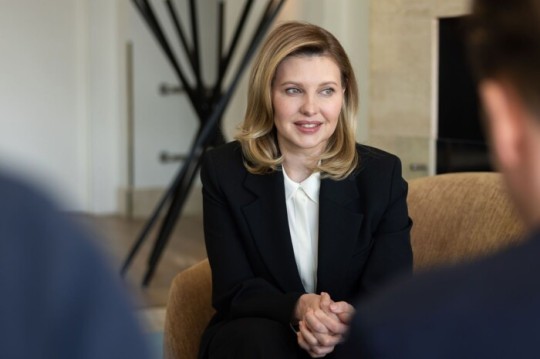
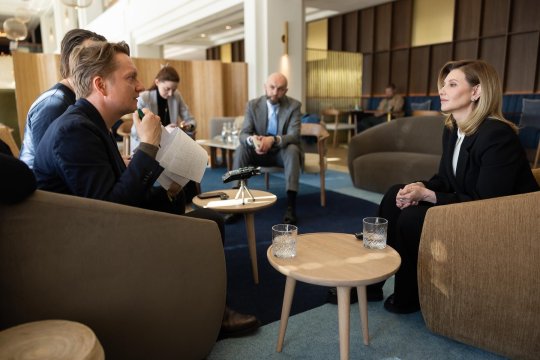

SIMON KRUSE Security Policy Correspondent
Tuesday, April 16, 2024, 20:40
Olena Zelenska's eyes grow distant as she ponders the question. She has just told us how she tries to dose the amount of horrific news from the frontline. One person cannot carry everything on their shoulders. But a person at war can't stop trying either. Especially when you're married to a President, and when even the rare moments that should belong to the two of them alone are also invaded by the all-consuming war. Because the answer to that painful question is yes. Even the President's own family can feel the discouragement sometimes. Olena Zelenska, the Ukrainian First Lady who has stood by her husband and her country, can also reach a limit. She smiles sadly at the thought. "Sometimes I ask him if he can give me some good news. Something optimistic. Give me something!" she says about her conversations with her husband, Volodymyr Zelenskyj. Berlingske meets Olena Zelenska in Copenhagen, where she is on a quick visit. A visit that otherwise brings more positive news for some of the efforts that the country's First Lady has fought most fiercely for. On Tuesday, the government announced another military aid package to Ukraine of DKK 2.2 billion. And the day before, a Danish coalition announced plans to build new homes for war-affected Ukrainian foster children and their families. This is part of what she is in Denmark to give thanks for. It "fills her with hope," she says. "I am impressed by how Denmark helps us on all levels," says the Ukrainian First Lady in an interview with Berlingske. But she also brings serious thoughts from the war-torn country. Thoughts about "the long war" and its growing impact on the mental health of an entire country. Because 780 days of defensive fighting with lost limbs, air raids, funerals and escape tear and rip at the supporting walls of a society in ways that we are only beginning to sense. "There are children who are three years old now, who are only beginning to understand the world, who don't remember anything other than war because they are too young. For them, air raid alarms are everyday life," says Olena Zelenska. But despite the obvious needs, talking about the psychological effects of the war is still a struggle for many Ukrainians. "That's why we are now doing everything we can not to lose a generation," she says. "It requires you to be brutally honest.
Things are going the wrong way at the front We meet at a time when the war is more unpredictable than ever. Russian forces are on the rise again, while parts of the promised Western aid are frozen in the US Congress. In several places along the front line, the invasion forces are eating away at the front line kilometer by kilometer. Most recently, Russia launched the fiercest rocket and drone attacks on the million-strong city of Kharkiv since the first phase of the war two years ago. They used targeted double strikes, where a precision bombardment against civilian targets is followed by another attack after a short pause. "They wait for the rescuers to arrive and then they attack again, killing the rescuers," says Olena Zelenska. Last week, a video footage showed how a rescue worker in Kharkiv found his own father among the dead. The video shows him sobbing next to the body. This is everyday life. Every single member of her own small Ukrainian delegation has lost loved ones in the war, says the First Lady. "A whole community has changed. No one is the same as they were before the war. Not even those who are alive and in good health. Some had to flee the occupation. Some were pulled out of the ruins of their own house," she says. Here, it would probably sound right to say that adversity only makes people stronger. But that's not always true. "It drains our strength, even though we want to hold on as long as we can because it's a matter of survival," says Olena Zelenska seriously. Because even internationally, the psychological consequences are far less talked about than the material destruction. But according to the Red Cross, there is an "imminent danger that a whole generation of Ukrainian children and young people will be lost". And even once the war is over, the number of war veterans will be staggering. Ukraine's Ministry of Health estimates that close to 40 percent of the country's population, 15 million people, are in need of psychological care. Between three and four million are estimated to need medication. Therefore, the first step is to break the taboo that is still attached to talking about psychological wounds, says Zelenska. She herself has become the face of a campaign under the slogan "How are you?" with the goal of getting people to talk about it. And to seek help. "Sometimes we say we're fine so as not to scare our loved ones. Sometimes we say we're fine so that we can bring peace to others. So our task is to teach society and all of us to ask ourselves how we really feel and what we can do about it," says Olena Zelenska. Ukraine's past as part of the Soviet Union - when psychiatric hospitals were used to punish dissidents - hasn't made that task any easier. But if the adult generation doesn't learn to talk about their own vulnerability, neither will the next generation. "Some parents of young children might tell you that the air alarm is something other than what it is. I don't think that's the right thing to do. You have to choose the right words and the right tone, but you have to tell the truth," says Olena Zelenska. If you dodge children's questions, they might imagine something even worse than reality. A genre of children's books has already emerged in Ukraine to help parents talk to their children about war.
The luxury of watching a movie Olena Zelenska knows all about the latter. She still regularly runs down to the bomb shelter with the Presidential couple's two children when the air raid sirens wail. And on the morning two years ago when war broke out, she was the one who had to tell them that Russian forces had invaded the country. The couple's daughter, Oleksandra, was 17 and their son, Kyrylo, had just turned 11. Did you tell the whole truth about the war to your children yourself? "I was afraid to do it, but by the time I was ready, they already knew almost everything," says Olena Zelenska with a wry smile. "Fortunately, my children are not that small. And actually, we experienced everything at the same time," she says of the evacuation from her home outside Kyiv as Russian forces advanced towards the capital. "For me as a mother, it was a tragedy that my children had to experience this. No parent could prepare their children for this," she says. The war has also turned the Presidential couple's personal lives upside down. For most of their adult lives, the couple has worked together. They both have a background in TV comedy. He on stage and she as a scriptwriter. Now, the security dictates of war require them to live apart most of the time. And while the war can make you despondent, it's not the despair that's the biggest issue. "We don't stop. We don't lose heart. I wouldn't say that anger is our main emotion. But what happens when you are beaten?" "You can submit or you can defend yourself. And that anger, that anger gives us the strength to defend ourselves," says the First Lady. She looks out the window over the Copenhagen canal. The Presidential couple often only see each other once a week, says Olena Zelenska. When they do, she prefers to reminisce about the old days. "Sometimes we can watch a movie together. I like to watch things that we watched when we were children or young people. Maybe a silly comedy," she says. Can you laugh when you're together like in the old days? "Yes, of course we do. We try to support each other that way by making each other laugh," says Olena Zelenska. But no one and nothing is the same after the outbreak of war. Not even laughter, which now serves a different purpose. Olena Zelenska quotes the Ukrainian poet Lesja Ukrajinka: "I laughed in order not to cry".
Article
#olena zelenska#russia#ukraine#war#ze interview#olena interview#olena selenska#zelenska#2024#interview 2024#selenska#berlingske#berlingske interview#translated interview
3 notes
·
View notes
Text
😮💨🤌😍









#we get it ze#we get it#same#i know im repeating myself BUT SHE IS SO PRETTY#LOOK AT THAT SMILE AND SIDE PROFILE#THE FIRST THREE PICS IN PARTICULAR#olena zelenska#olena selenska
14 notes
·
View notes
Text
L'Express: Olena Zelenska, First Lady of Ukraine: "Don't forget us!"
The wife of President Volodymyr Zelensky reminds us that the Russian-led war is still raging throughout her country.

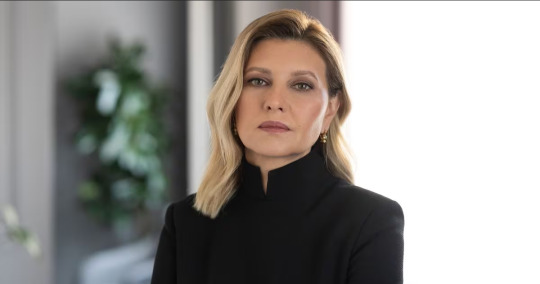
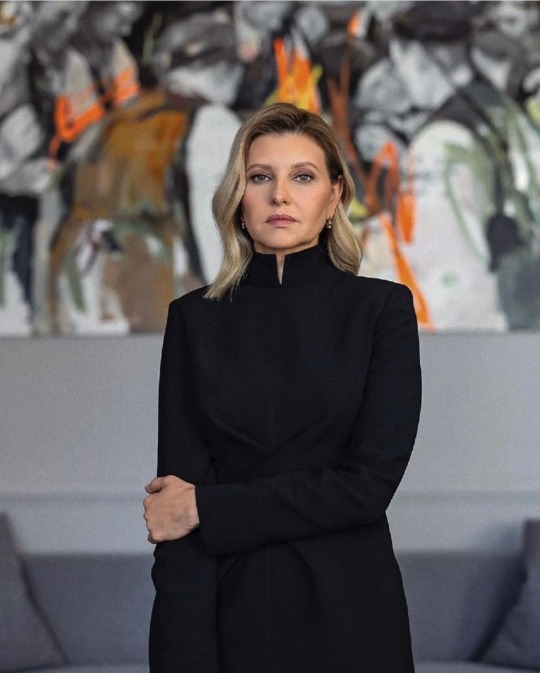
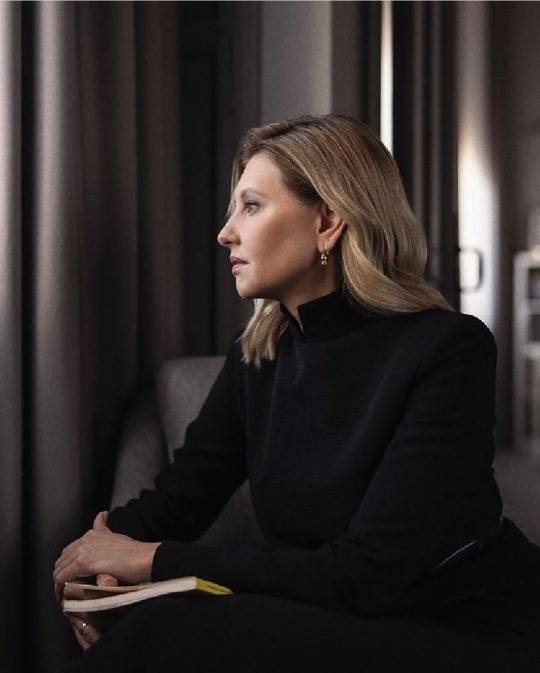
Propos recueillis par Eric Chol et Charles Haquet
Publié le 08/11/2023 à 10:57
She doesn't dress in khaki like her husband, Volodymyr Zelensky, but she too is on the front line defending her country. On November 8 and 9, Olena Zelenska is in Paris to inaugurate a Ukrainian cultural institute and raise funds for her humanitarian foundation. While the world's attention is focused on the Israeli-Palestinian war, and the Middle East is on the brink of explosion, the First Lady sends this powerful message to L'Express: "Don't forget Ukraine!" And let's not turn away from the soldiers fighting in the trenches of Bakhmut and Robotyne. Because their freedom is our freedom too. And Vladimir Putin will not stop at the borders of the former Soviet Republic. "The nature of an empire is to expand," she stresses. "It only stops if you stop it."
As one war drives out another, the mistake would be to consider that we cannot hold two fronts at the same time. And to admit that opinions "only have room in their intelligence and emotion for one conflict", in the words of philosopher Bernard-Henri Levy, co-author of a remarkable film on the Russian-Ukrainian conflict.
In Washington, the most radical Republicans, unconvinced by the Ukrainian counter-offensive, want to dissociate the aid given to Israel and Kiev. All the better to torpedo the latter. As US President Joe Biden says, Hamas and the Kremlin share the same goal: "to annihilate a neighboring democracy". Who, then, to favor? In reality, our only option is not to choose.
L'Express: Almost two years of war in Ukraine, a frozen front, a Russian army stepping up its bombing: how are the Ukrainians doing?
Olena Zelenska: It's a very difficult life. You'd think we'd get used to this stress, this constant upheaval, but that's not possible! A month ago, we experienced a great tragedy with the bombing of Hroza, in the Kharkiv region, where a Russian missile killed almost a third of the village's inhabitants. Imagine a funeral in every house… To top it all off, these people were gathered to attend a funeral, so it's the deaths that lead to other deaths, individual deaths, collective deaths. On October 21, the whole of Ukraine was shaken by the destruction of a postal sorting center in Kharkiv. Six employees working in the depot were killed. Some people abroad, and even here at home, sometimes imagine that there is a part of Ukraine where there is no war, where life is in full swing, where everything is going well. But this is not true! Because no matter where you are in the country, you can never be sure of being safe, of waking up the next day, of being able to go to work… The forecast horizon for Ukrainians has become very short. But we must continue to live, to develop, to rebuild, to raise our children. We must learn to plan each day, to adopt strategies, even if they may not be implemented. To my mind, it's a way of life, with the hope of victory on one side, which will come quickly, and on the other the constant trials that bring us down, but from which we have to get up every time.
As a frequent traveler in Ukraine, what is the story that has struck you most in recent weeks?
To tell the truth, I'd like to travel more in my country to meet the people who have suffered the most, but unfortunately this isn't always possible. Every discussion with my compatriots leaves a new imprint on my emotions. Let me tell you what has always impressed me. As part of my foundation's work, I meet regularly with foster families who take in children, most of them orphans, and these families are often made up of internally displaced people. They have fled occupied, bombed-out regions to settle in other parts of Ukraine. Unfortunately, in most cases, this is not the first time these families have fled: back in 2014, they had to leave the Donetsk region. Today, they have to leave their homes once again. Imagine their emotions! We're dealing with families who are constantly forced to flee the war, but it keeps catching up with them. To tell you the truth, I can't imagine how anyone can survive in this situation, how anyone can live when they're being chased by war. Because it's not a tsunami or a forest fire that forces them to leave: those who target them are people who come to kill, and that's what's so frightening!
Since the Hamas attack on Israel on October 7, all eyes have been on the Middle East. Do you fear that the world is turning its attention away from Ukraine?
First of all, I'd like to say that, like everyone else, we feel very strongly about what's happening in Israel, and we share the suffering of the Israeli people. We watched this terrorist attack by Hamas with great horror, but without surprise. It proves once again what we have been saying since the beginning of the war: if aggression is not stopped, it will continue in different forms and in different parts of the world. But we are not protected by the arrival of another tragedy, and that doesn't mean that the one in Ukraine has gone away. In fact, this war in the Middle East is only making the current tragic situation worse.
It is precisely for this reason that we hope the world will see how reacting slowly to tragedy only reinforces the desire of other aggressors to act. Impunity gives carte blanche! Particularly to those who have forces lined up behind them, enough financial and military resources around the world, and who feel that the time has come to act as they please, because they can. Unfortunately, this is the truth, which is why it's important to react quickly to all these aggressions, and not to each one separately, because they're all linked.
What is your message on this subject to the West, and in particular to France, where you have just arrived?
As I just said, it's vital not to let the world's attention wander away from Ukraine. We are already seeing that military aid to our country is arriving too slowly to bring about positive change on the front line. It's too slow, too quiet. It seems that Europe remains placid, and doesn't seem too frightened by the prospect of Russia's borders closing in on it. Yet this prospect is very real! Let's think about what would happen if Ukraine hadn't held out. In our place would be Russia, and hundreds of kilometers closer to you, to your homes. I wouldn't want other people in Europe, other mothers in Europe, to be afraid, not just of the possibility of Russian attacks, but of the physical sensation of that danger. Today, we are the barrier against this Russian advance. As long as we hold out, there's a chance they won't advance. But the empire won't stop if we don't stop it. Its nature is such that it must constantly expand. Otherwise, it ceases to be an empire! It's always looking to expand, and today, it's on our account. That's why we keep repeating that Ukraine defends the interests of the whole of Europe. Let's not forget that, and let's do things together!
You speak of a Europe that is too calm. How can we make sure it doesn't forget Ukraine?
We mustn't let it fall asleep! We often see this scene in the movies, of a person who's too cold, starts to freeze and falls asleep. If you don't want that person to die, you have to prevent them from falling asleep. I think the current situation is comparable: this sleep is dangerous for Europe. We can't fall asleep, we can't let Europe close its eyes today. I very much hope that my visit to France will serve as a reminder that the danger is still there. It is hanging over us now, and if we do nothing, it will unfortunately fall on your heads. I hope we can stop it.
During a recent visit to Washington, you said that the Russians wanted to destroy Ukrainian culture. As we know, war is fought in the trenches, but also on the cultural front. What can be done to counter the Russian narrative?
For a long time, Ukrainian artists and our country's cultural values and wealth were considered Russian by the rest of the world. Belonging to the Russian empire automatically made an artist Russian, which is not true. Today, our aim is to restore the place of this cultural heritage and tell the world what it really represents. I imagine that most French people don't always understand the boundary between Russian and Ukrainian. Many Ukrainian works around the world are still considered Russian. Take, for example, the dancers by French painter Edgar Degas. For many years, a painting was titled Russian Dancers. It was only recently that the National Gallery in London, then the Metropolitan Museum of Art in the USA, renamed it Ukrainian Dancers. The girls depicted are indeed groups of dancers in Ukrainian dress.
It's an example of the cultural battle we have to wage, even though we clearly don't have the means to devote so much money or administrative effort to beating Russian propaganda. We just can't. But we have to start disseminating more information about Ukraine in order to push back Russian lies. That's why I'm taking part in the inauguration of the Ukrainian Institute in Paris on November 9. This institute, the second to be opened abroad after Berlin a few months ago, is taking up residence at the Gaîté Lyrique in the heart of Paris. Its mission will be to disseminate knowledge about Ukraine and promote our culture throughout the world. Obviously, this work cannot be carried out solely from Ukraine - that would be too difficult. This is why this Parisian institute will be able to host artists' residencies and provide them with support, with the aim of creating cultural encounters and cross-cultural events, and strengthening cooperation with French cultural and scientific institutions. This will strengthen our ties and ensure that Russian stories are transformed and become Ukrainian stories.
Destroying Ukrainian culture also means stealing its future, in other words, its children. Several thousand of them have been deported to Russia: how can we get them back?
More than 19,600 Ukrainian children have been taken to Russia, according to our social services. It's a tragedy. I'm thinking in particular of this father from Marioupol, imprisoned by the Russians, whose three children were kidnapped. When he was released, he looked for them everywhere, he was desperate. Until one day, his son called him. He was in Russia and told him he was going to be adopted.
The longer the children stay in Russia, the deeper the psychological impact. The 380 children we were able to bring back to Ukraine all tell of the same ordeal. When they arrive in Russia, they are subjected to a patriotic education. They must learn to love their new homeland. To do this, they must be convinced that they have been abandoned and that no one is looking for them. It's real mental torture.
Unfortunately, there is no official way of getting them back. The Russians don't want to hear about it, they won't answer our questions. Our only recourse is action by the international community. At the last UN General Assembly, I proposed the creation of a mechanism that would at least enable us to establish a dialogue with the Russians, via a third country for example. For us, it's a question of making sure that these children are all right and that they can return home. As soon as possible.
You're very committed to the subject of mental health. What is the psychological state of Ukrainians after more than six hundred days of war?
Ukrainians are suffering from two types of illness. Firstly, there are those who feel fear, uncertainty and the inability to plan ahead. They have loved ones at the front who could be killed every day and every night. It's a constant source of anxiety. Our all-Ukrainian mental health program is working on this, with an emphasis on education. People need to understand what they're suffering from and know that they can be treated. Then, we need to deploy services that enable them to quickly get in touch with specialists, close to their home or workplace, free of charge.
And then there are the victims of post-traumatic syndromes - both military and civilian. They all benefit from adapted programs, including children, who are not always able to ask for help. We need to raise awareness among parents, who are sometimes reluctant to alert the relevant services. For example, the manager of a new rehabilitation program for traumatized children told me that their parents refused to let them go to a therapeutic camp, because they didn't understand how it could help them. We need to break this taboo.
Speaking of children, how are yours coping with this situation? What words do you use to reassure them? And how do they see the future?
The worst thing for us is not being able to make plans. We live from day to day, hoping for tomorrow. I have two children. My eldest daughter is 19, so she can already be considered an adult. She's at university. Half the courses are online, but she goes there from time to time, which is very good for her socialization. It allows her to make plans for the week ahead, it gives her a rhythm to her life and forces her to move forward. My youngest son is 10, and can go to school because the school has an air-raid shelter. This means he can attend certain classes face-to-face, have friends and communicate with them. It's a real blessing.
But when my children ask me, "When will we go to the seaside on vacation?", I can only reply, "Not now, but let's think together about what we'll do after the victory." This way of putting off all pleasant things until later, of not being able to give a date, obviously limits children in their dreams, in their projects. And it's the same for all the country's children. Youth is a time of dreams, and dreams should know no boundaries. Unfortunately, our children's dreams have limits, and these cannot be exceeded.
In 2022, you set up a foundation dedicated to humanitarian aid, health and education. What are the first results?
A positive one. In Izium, we are restoring the hospital, half of which had been destroyed and looted by the Russians. We have started work on the most critical unit, the four operating rooms. We now need to continue its reconstruction. Another priority is helping large adoptive families. Many of them are displaced persons who no longer have a home, and it is very difficult to find them a new one. Our project will enable us to build 14 apartment blocks for these families. The first residences will be available in December, the others in the spring. After that, we hope to build more. The need is great: at least 80 large adoptive families have lost their homes because of the war.
Secondly, we are trying to support our education system in the regions near the front. Our children and teachers need resources such as tablets and laptops. It's difficult to get materials to them because of the security situation. Last month, a Russian missile hit a school in Nikopol, southwest of Dnipro. The buildings were destroyed. We thought the laptops, donated by the United Arab Emirates, were lost. But when we cleared away the rubble, we realized that they were intact. We were able to deliver the laptops to the students, so that they could prepare to enter university and continue their studies. In one year, the foundation handed out almost 50,000 devices to children and teachers. Access to education, even in wartime, is a key issue.
And then there's the problem of bombing. In Ukraine, one school in seven can no longer accommodate children because it has no air-raid shelter to protect them in the event of an air raid. We are therefore building shelters in six schools and one kindergarten in the Chernihiv, Poltava, Dnipro and Kirovograd regions, and we plan to implement similar projects in other parts of Ukraine.
Finally, there's humanitarian aid. We are helping those most affected, especially those living in the Kharkiv and Kherson regions. When the Russians targeted our energy system last year, we supplied these people with dozens of electric generators. People were living in half-destroyed houses, with no heating, no electricity. They were suffering. We helped them heat their homes and provided them with basic necessities. We're preparing to do the same thing this year, because unfortunately there's no hope of Russia abandoning its destructive plans against our energy system.
How has the war changed you and your husband?
I feel as if the year and a half we've just lived through counts as ten years… It's been an extremely emotionally draining time. I hope that this ordeal won't change us forever, and that it won't prevent us from looking to the future with optimism.
Afterwards, knowing how I've changed, how my husband has changed… I think we'll be able to answer that question in several years' time, when we'll be able to take a cold look at all this madness. For the moment, it's not possible.
Article
#olena zelenska#olena selenska#ze interview#olena interview#russia#ukraine#war#translated interview#interview 2023#2023#lexpress interview#lexpress#zelenska
26 notes
·
View notes
Text
Sky News: 'Matter of life and death': Ukraine's First Lady begs Congress to approve more funding to war-torn nation, says air defence is her top priority
Ukrainian First Lady Olena Zelenska has called on Western politicians to stop the "political point-scoring" and think about the lives at stake during an interview for “Piers Morgan Uncensored” in London.
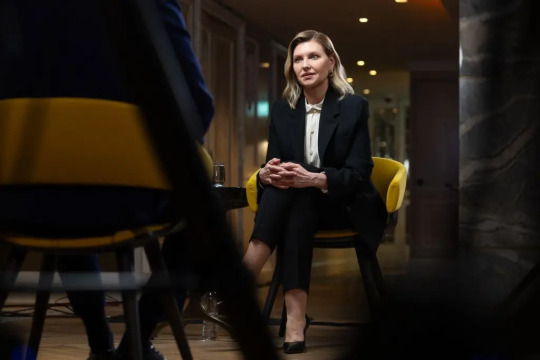
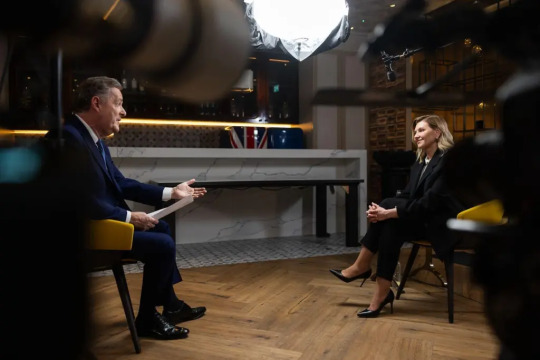
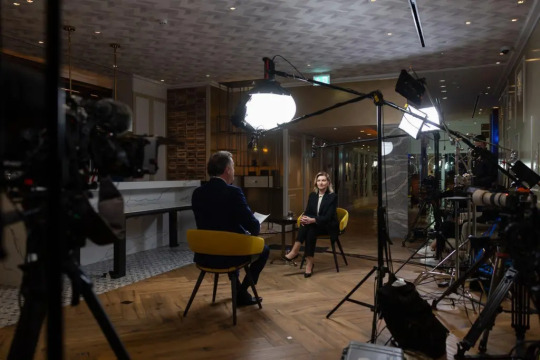
Piers Morgan New York Post Columnist
March 4, 2024 - 12:59PM
Olena Zelenska, the First Lady of Ukraine, fixed me with an ice-cold gaze when I asked her what message she has for America’s politicians currently holding up $60 billion of aid to help her country beat Vladimir Putin’s Russian invaders.
“This is a matter of life and death,” she said, “and I’d really like for those decision makers to understand that very profoundly. It’s not about money. It’s not about political point-scoring. It’s about life.”
Congress is engaged in a stand-off with hard-line Republicans insisting any more funding for Ukraine must be linked to stricter policies on the US southern border.
And the softly-spoken tension in Ms. Zelenska’s voice belies the desperation that many Ukrainians feel for its biggest, most powerful ally to step up again for them, before it’s too late.
Olena Zelenska, the First Lady of Ukraine, fixed me with an ice-cold gaze when I asked her what message she has for America’s politicians currently holding up $60 billion of aid to help her country beat Vladimir Putin’s Russian invaders.
“This is a matter of life and death,” she said, “and I’d really like for those decision makers to understand that very profoundly. It’s not about money. It’s not about political point-scoring. It’s about life.”
Congress is engaged in a stand-off with hard-line Republicans insisting any more funding for Ukraine must be linked to stricter policies on the US southern border.
And the softly-spoken tension in Ms. Zelenska’s voice belies the desperation that many Ukrainians feel for its biggest, most powerful ally to step up again for them, before it’s too late.
“While decisions are being taken,” she told me in an exclusive interview for “Piers Morgan Uncensored” in London, “people are dying and that’s the worst thing that can happen. I want them to feel that every hour that they hesitate, that they go to their offices, that they meet with their colleagues — in Ukraine, people are dying, and they do not have to be dying, and that’s the worst thing that is happening. I am sure that the majority of people there want to help Ukraine. And we understand the internal political processes in the United States, and we know they’re complex, they’re not simple. And we’re awaiting this decision, but we really, really need it.”
Top of her priority list is more funding for Ukraine’s air defense systems.
“Just for the civilian population,” she explained, “air defense saves lives everywhere in Ukraine. Russia, with their missiles and their drones, can reach any part of Ukraine and they’re constantly doing this. They want us to live in fear. And, yes, when we hear the siren of an air raid, we go down to our shelters, but not every place in Ukraine has shelters. And still, children in schools are dying. Children in their homes are dying while sleeping. And if we had enough air defense, we’d feel more resilient.”
It had been 20 months since I’d last seen Ms. Zelenska in Kyiv with her husband President Volodymyr Zelensky just four months after Russia brutally invaded her country.
But she was confused when I told her that timescale.
“I thought we met more recently?’ she replied with a quizzical expression.
“Not so long ago? My feeling was that not so much time has passed, so from this feeling, I can understand that for us, time has stopped in some way. In one way, things are happening very quickly, things are changing. But at the same time, we feel that time is static, I don’t think that in my life, something has changed significantly. We’re still living in the same mood as four months after the start of the large-scale war.”
Ms. Zelenska arrived for our interview with her team including the obligatory bodyguards who protect her everywhere she goes.
When the war began, she was identified by intelligence sources as Vladimir Putin’s No. 2 highest-priority target in Ukraine – after the President.
If the Russians could capture her, they could use that as maximum leverage to exert pressure on her husband.
Yet far from being cowed by this chilling ongoing reality, she exudes an air of impressively resilient defiance.
Ms. Zelenska arrived looking immaculately elegant in a black two-piece suit and cream blouse, clutching an iPhone, and greeting me in English with a warm smile: “Hi Piers, nice to see you again!”
“You must be exhausted?” I suggested.
“I’m a little tired,” she admitted. “But it’s OK. I don’t want to complain.”
Her sad eyes indicated a weariness at the sheer relentless hell of war and when we sat down, I asked a simple question: “How are you?”
“It’s difficult,” she conceded. “It’s not a sprint, it’s a marathon. You have to maintain your energy at some level. I compare the state to a smartphone when the battery is running out and you have an opportunity to charge it somewhere to make sure that you’re still online. You do it but you don’t have an opportunity to fully charge your battery. You can’t get distracted from the war. You can’t forget about the war, go on holiday for a week, away from the war. You’re constantly in this state and you cannot fully recharge. Ever. But the objective is to have enough energy. Enough to continue living, to carry on with life.”
Her spirits had been rallied in the UK by the support of the British Royal Family.
Last week, on the second anniversary of the invasion, King Charles, who is suffering from cancer, issued a message saying: “The determination and strength of the Ukrainian people continues to inspire, as the unprovoked attack on their land, their lives and livelihoods enters a third, tragic, year. Despite the tremendous hardship and pain inflicted upon them, Ukrainians continue to show the heroism with which the world associates them so closely. Theirs is true valor, in the face of indescribable aggression.”
“We were moved by his address,” said Ms. Zelenska, who met with Queen Camilla during her UK visit last week. “It’s very good to know that we have very sincere and powerful friends in the Royal Family.”
She wasn’t as moved by Putin’s State of the Nation address in Moscow last Thursday.
When I ask her if she has a message for the Russian dictator, her face tenses in visible disgust.
“To be honest, I wouldn’t even want to say this name. When we were children in the Soviet Union, sometimes children would write letters and put them in a time capsule and send them to space. And maybe somebody, sometime an alien will find this capsule and will read this message from these Soviet children from the 1970s. It’s the same thing. Why would I write this message to nowhere? Nobody will hear it. Nobody will pay any attention. It’s just addressed to nowhere.”
But when I pressed her again about what she would say to Putin if he was watching the interview, she said: “I just don’t know what this is for? I could never understand this. I do not understand any of the answers that he gives. I do not understand it, and I don’t know how a normal person can live with this?”
Then I asked her: “There have been hundreds of cases of Ukrainian women raped and abused by Russian soldiers. Over 20,000 Ukrainian children have been effectively kidnapped and taken out of the country. There have been barbaric attacks on maternity units and whole cities razed to the ground. I went to Bucha myself when I was over in Ukraine to hear the devastating stories of (the atrocity) what happened there. These are all war crimes. Should Putin be in an international court facing war crime charges?”
Ms. Zelenska replied: “Behind every crime, there is a person who carried out the crime and a person who commissioned the crime and we don’t know every person that carried out the crime, but we definitely know who commissioned the crime, who ordered the crime. And there needs to be punishment for every crime.”
The war, coming on the back of the COVID-19 pandemic, has taken a terrible toll of millions of Ukrainian families, not least on her own two children, a 19-year-old daughter Oleksandra and 11-year-old son Kyrylo.
“It would not be right to complain because the situation for our family is not that different from other families in Ukraine,’ she said. “But it’s painful for me that they’re losing these years of childhood… it’s difficult when you can’t plan anything for your children. You can’t dream together with them, to fill their lives with positive emotions. So, everything is on pause. No holidays, no rest. Everyone thinks about the war. My son talks constantly, and it’s very difficult to explain this to children. When your child asks you, ‘When will the war be over? Can you tell me?’ There is no answer. Nobody has this answer. We all want for this horrible time in our lives to be over.”
How often do the kids see Volodymyr?
“About once a week for a few hours. Sometimes less frequently when he has foreign visits, or he cannot meet us for other reasons. Never more frequent. Of course, it’s a very difficult time for him. He gets very tired. But he has his own ways to recharge. The children always help. And he can have a silly time with them, to sing silly songs, laugh with them, and that also helps him to recharge.”
And her?
“I can see him at the residential office sometimes, because I have my own office. And sometimes I can call him and if he’s not too busy, I can go into his office and see him. We can sometimes have lunch together but not too often. We have parallel lives but that’s normal.”
Does she ever get overwhelmed by the horror?
“It is a tragedy to live in the situation that we find ourselves and to see casualties every day. You cannot switch off your emotions. Recently, I was shaken by the tragedy of a whole family killed by missile strike, a mother together with her two sons. One of them was younger than one year old,” she says.
“They burned alive. These things don’t allow you to be happy or calm, ever, and there are some things that just finish you off, when you just start crying, and sobbing. Recently, there is a documentary made by one of our directors (Alan Badoev’s ‘A Long Day’) and I wasn’t able to watch it till the end.
“It consists fully of things that were filmed by people on their telephones at the start of the invasion. I could not stand it for a very long time. I was in tears. I felt overwhelmed. Emotions. It was really powerful. I will finish watching this film today, but I just didn’t have enough emotional reserves to finish it the first time. There’s another documentary, ’20 Days in Mariupol.’
“My daughter went to see it at the premiere with her boyfriend who is from Mariupol. And he and his parents hid in the basement of their building for several weeks before they were able to flee. And he saw with his own eyes the bodies of his neighbors that had been killed. And I asked her, ‘How did you take it?’ And she said, ‘I cried.’ He cried also. But also, the rest of the people in the cinema cried.
“On the one hand, it’s very difficult but on the other hand, sometimes you need to let it out. You need to cry. All of the emotions that we accumulate every day. I’m very grateful to the people who made these documentaries because they tell the world about us and for us it’s a way of therapy. A way to let it go to…and we cannot do it all the time.
My job is to keep smiling, to keep talking to people, to inspire people. Regardless of whether or not I have the energy for that, so I try to keep my emotions inside. And these things are a way for me to let go for at least a few minutes.”
To lighten the mood, I read a tribute Volodymyr had paid to her in Vogue Magazine, when he said: “She is my love. She is my greatest friend. Olena really is my best friend. She’s also a patriot, and she deeply loves Ukraine, and she’s an excellent mother.”
Olena’s face instantly lit up into a beaming grin.
“I can only say thank you for the words. It’s not the first time I hear this, fortunately he tells me this very often. But we are really friends and I think that’s the secret of our relationship. We don’t have a difficult time with each other. We understand each other and we support each other. It’s not just the words, well done, keep working, I believe in you. No, we can make each other laugh when it’s needed or we can tell each other, ‘Get a grip, go get your job done.’ So, we feel each other. It’s very nice for me that he’s so open with his feelings with the media, however, I don’t need to hear them. I know this and I can feel it.”
The worst moment for them came in those first chaotic hours of the war.
“The most difficult time for us was when we were separated. He stayed in Kyiv, and I had to go outside of Kyiv and spend several weeks outside of Kyiv. And this is when I had the most horrible thoughts come to my head and I was thinking that perhaps we’ll never see each other again. And what allowed me to hold on is that we still have a lot to do together, that I want to do together.”
On his birthday on Jan. 25, 2022, just before the war started, she posted a photo of Volodymyr smiling at her at a party, and wrote: “I wish every woman had these views… I always feel your love… as long as you look like that, I’m not afraid of anything. We have to realize everything we dream of together. Happy birthday to my love.”
This year, on the same day, a Russian military transport plane crashed killing 65 Ukrainian prisoners of war.
“I didn’t post on his birthday because that day, many tragic things had happened,” she said, “and we agreed that I’m not going to wish him happy birthday publicly. It wasn’t the right time to talk about happy things. I suggested that we stay silent on that day, and he understood that.”
President Zelensky has come under increasing criticism in Ukraine where political opponents have accused him of corruption and becoming an autocrat, and this has led to falling approval ratings.
The Mayor of Kyiv, former World Heavyweight Boxing Champion Vitali Klitschko, sniped recently: “Zelensky is paying for mistakes he’s made. At some point, we will no longer be any different from Russia, where everything depends on the whim of one man.”
Ms. Zelenska is phlegmatic about the attacks: “I would very much like for the person who is responsible for everything to be somebody else, not my husband whom I love and respect. But he is responsible for everything, and he carries the responsibility. Political struggle never stops. Not even during the war. That’s how the world is. Nobody’s ever happy with everything, especially in a difficult time like this. Of course, it is difficult for the people to carry this load of war. Sometimes people see bad things happening and they’re looking for someone to blame and I guess, the easiest person to blame is the person who’s responsible for everything. I’m fine about this criticism.
“What I don’t accept is total hatred which is not based in facts. And I know that the aggressor (Russia) will always stoke any kind of tension inside the country that would undermine our unity. And a lot of resources are spent on this. They use every opportunity in Ukrainian society to stoke the negative things. And I understand the rules and I’m fine with this. He will take any criticism. For me, perhaps, it’s more difficult emotionally because I take offense sometimes, I get upset. All of these things are hurtful when it’s being said about the person you love and respect, it’s never nice.”
There are growing calls for the transfer of Russian assets in countries like the United States to pay for the recovery of Ukraine.
“I think this is fair,” said Ms. Zelenska. “Russia has to pay financially for the damage done to Ukraine, for the destruction of our infrastructure. We understand that we may never see any financial compensation directly, so it would be fair for these financial assets that Russia has in our partner countries to be frozen and to be spent on the renewal of our infrastructure. Why should our partners help us to rebuild? Why shouldn’t it be the people who destroyed it?”
One of Ukraine’s biggest problems is global “war fatigue” with the media’s attention drifting away to other conflicts like the Israel and Hamas war in Gaza.
“We need to understand that more wars can start in other places, but it doesn’t mean that the war in Ukraine will stop,” she says.
“And this fatigue from the war, well, of course, it’s hurtful to hear for us. The Ukrainians have much more fatigue! Ukrainians are tired, but we have to hold on, because this is a matter of our survival. Don’t get tired. If you’re tired, you’re not our allies. We cannot allow you to get tired. We cannot say, ‘Don’t look at us. Don’t look at us suffering.’ If you’re tired, you’re not our friends. It’s sad but that’s life and we’re going to continue fighting for our lives, for the lives of our children, and we will not get tired doing this.”
Her response to Donald Trump’s claim he could end the war in 24 hours?
“I don’t think that anyone can end this war in 24 hours except Putin.”
As to those who want Ukraine to throw in the towel and make a peace deal where Putin gets to keep the land he’s murderously stolen, Ms. Zelenska is emphatic in refuting the notion of surrender:
“President Zelensky gave a very clear answer. And it’s not just his opinion as the leader and president of our country, it’s an opinion that he expresses on behalf of our nation. We’re not prepared to make allowances. We understand that the aggressor (Putin) does not stop when he receives what he wants. He will continue moving further and further. We don’t want our children to still be fighting in this war and then our grandchildren. We want to stop this now, but we will not stop this on their terms.”
And with that final passionate declaration, First Lady Olena Zelenska bid me farewell and hurried away to start the long 20-hour plane-train-car journey back home to Kyiv, and the war that never ends.
Originally published as 'Matter of life and death': Ukraine's First Lady begs Congress to approve more funding to war-torn nation, says air defence is her top priority
Article
#olena zelenska#russia#ukraine#war#ze interview#olena interview#olena selenska#interview 2024#2024#zelenska#new york post#new york post interview
13 notes
·
View notes
Text
Financial Times: The FT’s 25 most influential women of 2023
Women were at the helm and in the trenches of the world’s most profound transformations

Influence — the power to persuade, advocate for change and imagine better ways of doing things — takes many forms. Nowhere is this more clear than in the magazine’s annual Women of the Year issue, a list of the world’s most influential women written about by other powerful women on the international stage.
Chimamanda Ngozi Adichie describes Lola Shoneyin’s work as a labour of love, noting that she “tirelessly splices present and future, nurturing what is, while making room for what will be”. It’s an apt description for the contributions made by all the exceptional women featured in this issue.
Roula Khalaf, editor of the Financial Times
Olena Zelenska
First lady
by Kaja Kallas
What I admire most about Olena Zelenska is her honesty. A screenwriter by profession, she knows how not to mince her words while remaining disarmingly human. Four months into Russia’s invasion of Ukraine, Zelenska told a journalist: “None of us are OK.” She knows what it is like to wake up to see your homeland invaded by an imperialist neighbour; not to know when, or if, you will next see your loved ones; how to find the strength to fight for freedom, despite it all. Like her husband, Zelenska has become a global symbol of resilience. Her leadership in addressing mental health for Ukrainians during war is vital. Her work shining a light on the suffering and deportations of Ukrainian children by Russia brings back memories of my own family history; Russians deported my mother to Siberia when she was a baby. Estonia has partnered with Zelenska’s foundation to build family homes for children whom Russian bombs have turned into orphans. She is remarkable in her attention to detail and her ability to listen. The world should now listen to Zelenska and give Ukraine what it needs to defeat Russia and end the suffering.
Kaja Kallas is the prime minister of Estonia
Article
#olena zelenska#olena selenska#russia#ukraine#war#ze interview#olena interview#interview 2023#2023#financial times interview#financial times#zelenska
12 notes
·
View notes
Text
TIME: The 100 most influential people of 2023 - Olena Zelenska

BY JILL BIDEN
APRIL 13, 2023
A writer who worked behind the scenes, she never asked for a spotlight. A mother of two, she never asked to become the heart of a nation at war.
Olena Zelenska didn’t expect to become a warrior for the people of Ukraine, but she has answered this call with selfless courage.
I met the First Lady last Mother’s Day in a small town near the edge of her country, just a few months after Russia’s unprovoked war of aggression began. Instinctively, we embraced—two mothers, two nations, coming together for peace. In the strain of her smile, I could see the weight she carried: the sleep lost to the percussion of falling bombs, the tales of atrocities that she would never forget. In her eyes, however, was the fierce determination and dignity that has defined her people.
She could take her family and flee. What mother would blame her? Yet, she stays. She stays because freedom and democracy deserve defenders. She stays to show the world that heart and hope can make even the largest tyrant seem small. She stays for her children—for their future, and the future of all Ukrainians.
Olena Zelenska is a mother. Protector. The pride of her nation. A beacon of hope for the people she loves.
Biden is First Lady of the United States
Article
#olena zelenska#olena selenska#ze interview#olena interview#ukraine#war#russia#time interview#interview 2023#2023#time#zelenska
26 notes
·
View notes